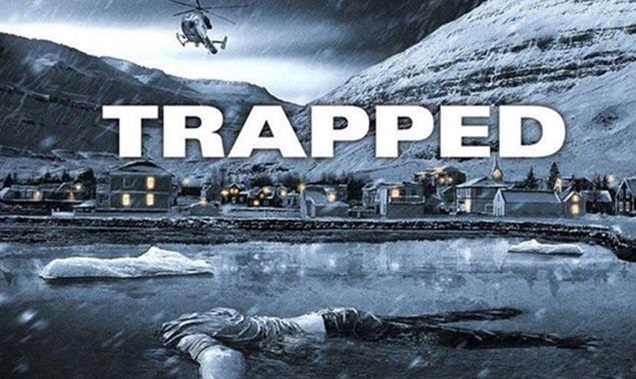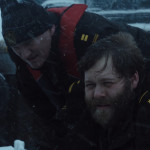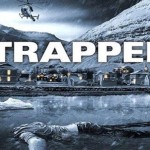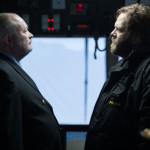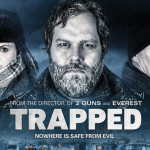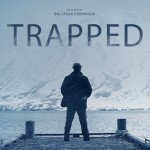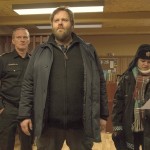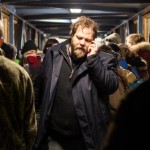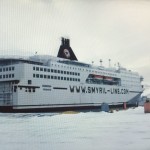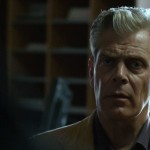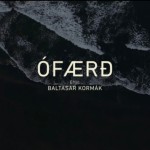Another day, another grim, dark and moody Nordic police drama. Baltasar Kormákur‘s Trapped is, however, a quietly superior police procedural, in the same way that The Killing and The Bridge apply a very different style from the American and British versions to which we are more commonly accustomed.
Iceland is not a huge country, but its geography, demographics and climate mean that for those in the tiny town of Seyðisfjörður in the far east, as far from Reykjavik as it is possible to go, a blizzard and an avalanche on the Fjarðarheiði mountain pass can mean residents are completely cut off from civilisation, even by air.
It is also a country that interrogates its own past, such that the infamous volcanic eruption under Eyjafjallajökull glacier in 2010 is matched by the swiftness with which bankers were punished for their misdeeds in the 2008 financial crisis that almost bankrupted the country. Plenty of scope then for a drama played out against the worst of the climate and with the memory of past corruption and misdeeds still fresh.
Local police chief Andri Olafsson (Ólafur Darri Ólafsson), a bearded bear of a man with two small daughters from his now defunct marriage, has a team of two (Hinrika and Ásgeir, played respectively by Ilmur Kristjánsdóttir and Ingvar Eggert Sigurdsson) to support him police a tight-knit community where everyone is on first-name terms (given names being the correct form of address in Iceland) and know one another’s past misdeeds – as I say, memories linger in rural Iceland.
There is the dodgy mayor and ex-police chief Hrafn; young Hjörtur, who suffered a prison term following a fire in the fish factory that killed his girlfriend Dagný; Leifur, owner of the fish factory, and hotel owner Guðni, both of whom appear to be up to no good; Eiríkur, Dagný’s father, who is bitter and revengeful; Guðmundur the fisherman, who will not sell his land to the company looking to sell to the Chinese to build a major port in the town, and his son Sigurður; and if you think the men sound like they are a powder keg waiting to explode, I’ve not started on the women yet, nor especially Andri’s own family.
Into this explosive atmosphere comes a ferry from Denmark, captained by the stolid and obtuse Soren Carlsen. Two events happen in quick succession: a torso is dragged up from the harbour, then a member of the Lithuanian mafia is identified in a camper van containing, as it turns out, two Nigerian sisters caught unwittingly in the sex traffic trade.
If identification of the torso is not hard enough, it vanishes from the fish factory where it is secured pending the arrival of the homicide squad from Reykjavik, and the Lithuanian, Jonas Malakauskas, escapes from prison but kills himself in an accident in the snow. The girls also escape from hiding and into the relative safety of the home of Hinrika and her strange husband, Bárður.
There is an unmistakable majesty to the snow-ridden landscape, but at least one, maybe two killers are at large. As the town is cut off by the weather, the claustrophobic atmosphere closes in and intrigue grows, with the brooding Andri caught between his loyalties to family and duty, and defying the arrogant Reykjavik Chief of Investigation Trausti. There is a psychological element to the investigation, but also personal dilemmas since Andri and his team are members of the same community they are investigating – vested interests are at play.
Tell the truth, I was hooked, trapped even, from the start, at least in part because I’ve recently experienced both the grandeur of the Icelandic landscape and the phlegmatic and insular personality of its people.
Credit to Baltasar for building on these brooding elements to deliver a first rate thriller, hopefully with scope for a sequel – not that murders are exactly commonplace out in that part of the world (any more than the population of Oxford has a higher rate of murders than New York City thanks to Morse!)

